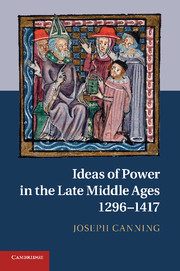Book contents
- Frontmatter
- Contents
- Preface
- Abbreviations
- Introduction
- Chapter 1 Ideas of power and authority during the disputes between Philip IV and Boniface VIII
- Chapter 2 Dante Alighieri: the approach of political philosophy
- Chapter 3 Marsilius of Padua
- Chapter 4 Power and powerlessness in the poverty debates
- Chapter 5 The treatment of power in juristic thought
- Chapter 6 The power crisis during the Great Schism (1378–1417)
- Conclusion
- Bibliography
- Index
Chapter 5 - The treatment of power in juristic thought
Published online by Cambridge University Press: 25 October 2011
- Frontmatter
- Contents
- Preface
- Abbreviations
- Introduction
- Chapter 1 Ideas of power and authority during the disputes between Philip IV and Boniface VIII
- Chapter 2 Dante Alighieri: the approach of political philosophy
- Chapter 3 Marsilius of Padua
- Chapter 4 Power and powerlessness in the poverty debates
- Chapter 5 The treatment of power in juristic thought
- Chapter 6 The power crisis during the Great Schism (1378–1417)
- Conclusion
- Bibliography
- Index
Summary
The fourteenth-century writers who were pre-eminently concerned with questions of power and legitimate authority were Roman and canon law jurists. For them, jurisprudence was concerned not just with explaining the content of the law but with accommodating it to the real world. These jurists were committed to applying the law to political and social reality – with putting ideas into practice. Law was concerned not just with abstract theorizing but with action. Jurists therefore illustrated the focus on political reality characteristic of fourteenth-century political thought particularly well.
How we understand political phenomena and the categories we use to describe them tend to be expressed in terms of acknowledged or unacknowledged pre-existing systems of thought or languages. In the fourteenth century a particularly important example of the problems involved in this process was provided by Italian jurists' attempts to adapt the ius commune (common law) system of Roman and canon law to include emerging city-republics, kingdoms and lordships – that is, to adapt that law to changing political realities. Two kinds of problem are involved. The first was for the jurists themselves, as it were: how successfully did they manage to achieve their aim within terms of the Roman and canon law? The second is of more general interest to political theorists: how valid is the metalanguage used by modern political theorists and historians to interpret the solutions of these fourteenth-century writers? How useful are standard concepts from western political theory when applied to elucidating their ideas? Two terms in particular take centre stage in any discussion of the location of legitimate authority. Modern interpreters of these jurists' political thought have been concerned with demonstrating that they produced notions of sovereignty and state: I would include C.N.S. Woolf and Quentin Skinner, for example, and indeed my own works. But might this not be to privilege concepts important from the sixteenth to the twentieth centuries but now increasingly superseded in the twenty-first century, through globalization, the European Union, the influence of the United States as a superpower, and Islamic fundamentalism? The study of the fourteenth century forces one to step back and ask whether there are consistent operating concepts of political thought at all or whether one can use terms like sovereignty and state as tools of interpretation, so long as one realizes that there are bound to be subtle differences in any application of them in specific historical circumstances. This chapter is concerned firstly with asking the general question of how useful notions of sovereignty and state are for interpreting juristic ideas of legitimate authority, and secondly with addressing the unique test case of the status of papal temporal power in the papal states.
- Type
- Chapter
- Information
- Ideas of Power in the Late Middle Ages, 1296–1417 , pp. 133 - 164Publisher: Cambridge University PressPrint publication year: 2011
- 1
- Cited by



